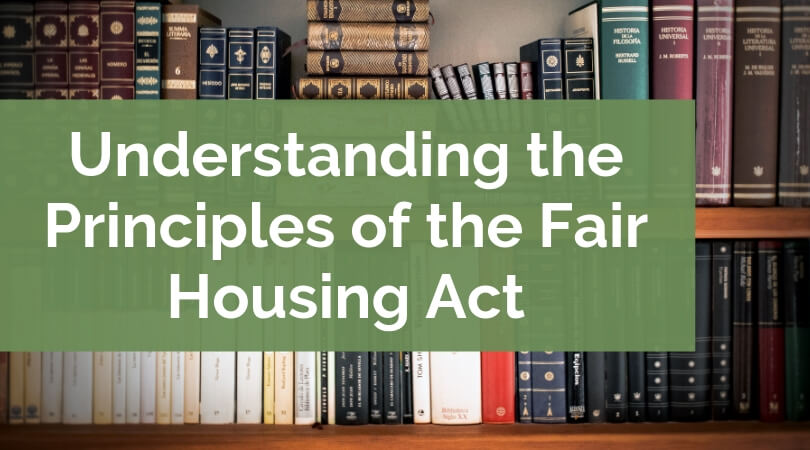The Fair Housing Act gives every American the right to equal treatment in regards to housing. It was established in 1968 and is strictly enforced by the Department of Housing and Urban Development (HUD).
As a Pierce County rental property owner, it's important you familiarize yourself this legislation.
Failure to abide by the Fair Housing Act can result in costly legal proceedings. This can quickly turn your rental property into a financial and emotional nightmare.
In order to help you get started, we've put together this article that will give you an overview of some of the most important elements of the Fair Housing Act.
Principles you should know about the Fair Housing Act
First things first - what exactly is the Fair Housing Act? Well, FHA is a law that was passed in 1968 and forbade discrimination against certain members of a particular class in society.
The classes that it protected include national origin, religion, race, and color. Later, disability, sex, and familial status were added to the list of protected classes.

Before the passing of this law, housing discrimination was rife and there was mounting pressure to change the status quo.
With the new law implemented, it meant that every American has a right to equal and fair treatment when it comes to housing regardless of their class.
This right covered things like renting a home, property buying and selling, and mortgage acquisition.
Now that you have an idea about how the Act came to be and what it entails, here are important items you should pay close attention to.
1. Know how to advertise your rental property.
As you probably know, finding tenants is the first step in a profitable rental property. Once you have acquired a property, the next item on your list isis to try and find a suitable tenant to occupy it.
While doing so, however, the key is to ensure that the process is devoid of any discrimination. In other words, as a landlord, you should ensure that the process is fair to every applicant.
Here are some examples of discriminatory statements you should absolutely avoid in your advertising copy.
- “Only females preferred” or “No young men allowed”
- “Superb for singles only or couples only” or “quiet and mature neighborhood”
- “Blacks only” or “No whites”
- “Muslims only” or “No Christians”
The sex, marital status, race and religion of a tenant is, respectfully, none of your business. A tenant could sue you for discriminating against them if you include any of these statements in your advertising copy.
As a rental property owner, strive to be on the safer side of the law and put more focus on branding your property rather than describing the kind of tenants you want to occupy your property.
2. Know how to screen your prospective Pierce County tenants.
Tenant screening is a very important exercise regardless of how time-consuming it may be. When done in the proper manner it helps limit future problems.
The screening process starts with the first contact you have with your potential tenant. The contact could be via a call, a text or during the property showing.

It’s usually during this time that you could find yourself making discriminatory remarks. Here are some examples of questions that could be considered discriminatory:
- Are you Japanese or Chinese? Asking a tenant about his or her race is considered discriminatory. This is because race is a protected class under the Fair Housing Act.
- Is this a service animal? Asking a tenant about his or her service animal could make the tenant interpret that you don’t rent to disabled persons. This is discriminatory, as disability is a protected class. Instead, ask for the certification status of the animal.
- Do you have any children? Familial status is a protected class under the Fair Housing laws and asking this question to a tenant could be deemed discriminatory. Instead, ask about the number of occupants that will be occupying the property.
Would you be interested in joining the beautiful church in our neighborhood? Religion is also a protected class under the Fair Housing Act. This question may make a tenant interpret that you rent to Christians only.
3. Understand what classes are additionally protected in Washington.
There are seven classes of people at the federal level that are protected by the Act. This includes, color, disability, religion, sex, familial status, national origin and race.
To add on, other states have also added their own set of additional protected classes. Pierce County is no exception.
As per Tacoma Municipal Code Chapter 1.29, it’s illegal to discriminate in the sale, financing, renting, insurance, or advertising of housing based on a tenant’s:
- Military status
- Marital status
- Age (over 40)
- Sexual orientation
- Gender identity
- Use of Section 8 certificate or other alternative sources of income

4. Understand the eviction laws
It's quite common to have disagreements in the rental property business.
With that said, not all disagreements should automatically lead to an eviction. Some can easily be avoided by simply having a good communication system with your tenant.
But when all else has failed, an eviction could be the only solution left. In the unfortunate event of an eviction, ensuring that the process follows legal regulations is crucial.
Evicting a tenant as a retaliatory act is against the provisions of the Fair Housing Act.
Here are a couple of examples of situations that could be considered a retaliatory act:
- Increasing your tenant's rent after they complain to a health inspector about unhealthy living conditions.
- Refusing to renew a tenant's lease without any valid reason.
All states have a comprehensive landlord-tenant law that stipulates the responsibilities and duties of each party involved under the lease.

The circumstances under which the rental or lease agreement can be terminated are also stipulated in the law. To evict a tenant in any state, including Washington, the reasons must first be legally valid.
You cannot just evict a tenant for any reason. Most common reasons include:
- Violation of the lease agreement. For example, subletting the property when the lease outrightly mentions it’s illegal to do so.
- When there is excess property damage. For example, broken doors and windows.
- If there is a criminal or a drug-related activity in the property.
- If the lease has expired. A tenant must either move out or renew their lease once their existing term has come to an end.
- If the tenant does not pay rent.
And even when a tenant has committed any of these violations, it’s only the sheriff who’s mandated to evict a tenant should the judgment fall in your favor.
There you have it. 4 important things that every Washington landlord should know about the Fair Housing Act. The best way to ensure you become a successful landlord rental property owner is by first understanding the laws that govern the business. If you'd like help with your rental property don't hesitate to reach out to us at Tacoma PMC!




